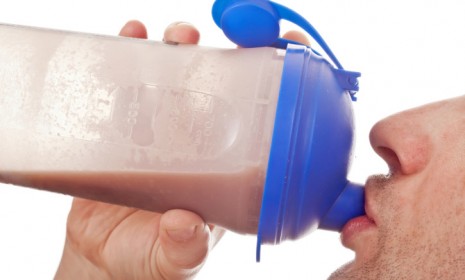Is it safe for teens to guzzle protein shakes?
A surprising 34 percent of teen boys have used protein powders and shakes in the past year, says a new survey — amid concerns about muscle-building supplements

A free daily email with the biggest news stories of the day – and the best features from TheWeek.com
You are now subscribed
Your newsletter sign-up was successful
The question: With the media fixating on six-pack abs and bulging biceps with the same fervor it once reserved for female body parts, it's no surprise that more young men are trying to get ripped. But how far are they willing to go? A new study published in the journal Pediatrics takes a look at adolescents' muscle-building habits and what kinds of practices, however dangerous, teens are willing to partake in.
How it was tested: Maria Eisenberg, a researcher at the University of Minnesota in Minneapolis, and her team surveyed 2,800 kids and teens at 20 different middle schools and high schools in the Minneapolis/St. Paul area. Not only were kids surveyed on food and weight-related behaviors, they were asked about their use of muscle-building supplements — including protein powders or shakes, creatine (a chemical often favored by bodybuilders), and steroids. Most of the participants surveyed came from either poor or middle-class households.
The outcome: To the "surprise" of researchers, 34 percent of teen boys and 20 percent of teen girls said they have used protein powders in the past year. What's more: 10 percent of boys and five percent of girls admitted to using creatine or other "muscle-enhancing" substances, and more than five percent of both boys and girls have used steroids. "Five percent doesn't sound like much," says Dr. Claire McCarthy at Boston.com, "but that's one in twenty — so out of each middle or high school classroom, one kid would be using steroids." Researchers also noted that overweight and obese girls were more likely to use protein powders and shakes than were normal weight girls.
The Week
Escape your echo chamber. Get the facts behind the news, plus analysis from multiple perspectives.

Sign up for The Week's Free Newsletters
From our morning news briefing to a weekly Good News Newsletter, get the best of The Week delivered directly to your inbox.
From our morning news briefing to a weekly Good News Newsletter, get the best of The Week delivered directly to your inbox.
The problem: Teen bodies are still changing, says Boston.com's McCarthy. "Overuse of protein powders can lead to malnutrition, weight gain, and other possible health problems," and a few even contain heavy metals like "arsenic, cadmium, lead, and mercury." Meanwhile, creatine can cause kidney, liver, or heart trouble, while the well-known risks of steroid abuse include increased blood-pressure, aggression, infertility, and even heart attacks.
What experts say: While the media has long perpetuated images of women with almost no body fat, it's increasingly depicting men with equally hard-to-obtain, super-muscular bodies. "Boys' body dissatisfaction has simultaneously increased," say the study's authors, "and research has demonstrated that exposure to images of extremely muscular models contributes to body dissatisfaction." And it's not just males who are fixating on their abs, says McCarthy. While thinness was once enough for young women, now "it's about having muscle definition," too. Exercising is a fine way to tone up, but protein shakes, which are high in calories and can lead to unhealthy weight gain, "could seriously backfire" on teens who don't realize that supplements are just that — supplements.
A free daily email with the biggest news stories of the day – and the best features from TheWeek.com
-
 The Olympic timekeepers keeping the Games on track
The Olympic timekeepers keeping the Games on trackUnder the Radar Swiss watchmaking giant Omega has been at the finish line of every Olympic Games for nearly 100 years
-
 Will increasing tensions with Iran boil over into war?
Will increasing tensions with Iran boil over into war?Today’s Big Question President Donald Trump has recently been threatening the country
-
 Corruption: The spy sheikh and the president
Corruption: The spy sheikh and the presidentFeature Trump is at the center of another scandal